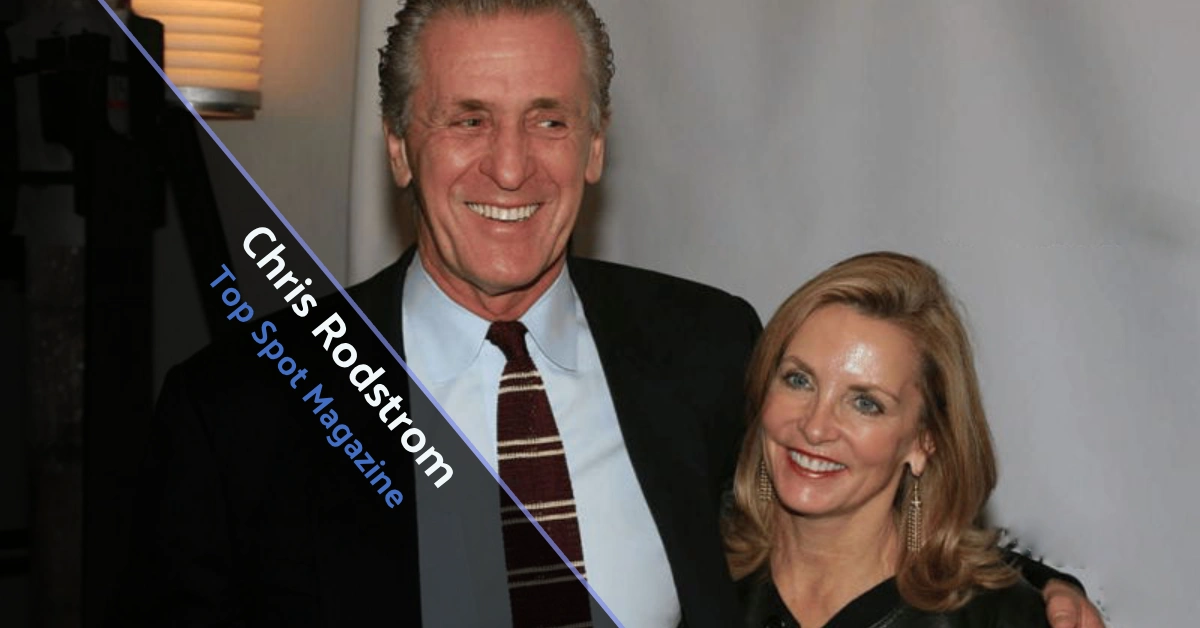You know Pat Riley. The slicked-back hair, the Armani suits, the championship rings that could fill a jewelry store. But here’s the real question: Who’s the woman who stood beside one of basketball’s most intense figures for over five decades without becoming a tabloid fixture?
Chris Rodstrom isn’t your typical NBA wife. She didn’t chase cameras or build an Instagram empire off her husband’s fame. Instead, she carved out her own identity as a psychologist, raised two kids through constant cross-country moves, and somehow maintained sanity while married to a man whose job literally depends on winning basketball games.
This is her story—one that reveals what it actually takes to build a meaningful life when your partner’s career demands everything, including the spotlight you never asked for.
The Maryland Roots That Shaped Her Independence
Born in 1951 in Maryland, Chris grew up in a household that didn’t mess around. Her father served as a Navy captain, while her mother worked as a medical administrator within the same military structure. Discipline wasn’t just expected in the Rodstrom household—it was woven into the daily fabric of family life, shaping her approach to challenges that would come decades later.
That military precision translated into academic excellence. Chris pursued psychology at the University of San Diego, demonstrating intellectual curiosity that went beyond checking boxes for a degree. She wanted to understand what made people tick, how relationships survived stress, and why some partnerships thrived while others crumbled under pressure. Little did she know these insights would become her personal survival kit.
The foundation she built during these formative years gave her something crucial: an identity separate from anyone else’s achievements. When you grow up watching discipline in action, you learn that real strength isn’t loud or performative.
How a Casual Campus Friendship Became a Five-Decade Partnership
1967 changed everything. Chris met Pat Riley on the University of San Diego campus when he was playing basketball for the San Diego Rockets. Their connection started casually, built on mutual respect rather than Hollywood-style dramatics. Pat was focused on his game, Chris on her studies, and somehow their paths kept intersecting in ways that felt natural rather than forced.
They dated through Pat’s early basketball career, navigating the uncertainty that comes with professional sports. Would he make it? Would the relationship survive if he didn’t? These questions hung in the air as their bond deepened. On June 26, 1970, they got married in a private ceremony that reflected their preference for substance over spectacle—a pattern that would define their entire relationship.
What made their partnership work from day one? Chris brought psychological insight to a world driven by emotion and ego. Pat brought intensity and ambition to a relationship that needed stability to survive. They weren’t trying to be the perfect celebrity couple. They were just two people figuring out how to build something real.
The Psychology Career That Defined Her Before Basketball Did
After graduating, Chris Rodstrom didn’t just dabble in psychology—she built a legitimate practice. She became a licensed psychologist and marriage counselor in Los Angeles, specializing in therapy for individuals and couples navigating relationship struggles. Her approach was empathetic but grounded, blending warmth with practical strategies that actually helped people change their patterns.
Understanding human motivation, stress responses, and interpersonal dynamics gave her tools most people don’t have. When your husband’s job security depends on whether 12 athletes can cooperate under pressure, having psychological training isn’t just helpful—it’s basically a superpower. She could read situations, anticipate emotional needs, and provide perspective when the basketball world felt like it was spinning out of control.
In 1981, Chris made a decision that raised eyebrows: she retired from her thriving practice. Pat’s coaching career was taking off, their family needed stability, and someone had to manage the chaos of constant relocations. This wasn’t about abandoning her professional identity. It was about choosing where to direct her energy during a specific life phase, understanding that partnership sometimes means one person provides the foundation while the other pursues demanding goals.
Raising Kids While Your Husband Coaches Championship Teams
Chris and Pat welcomed two adopted children into their lives—James Patrick in 1985 and Elisabeth in 1989. Adoption wasn’t Plan B for them; it was a conscious choice to expand their family with intention and love. But raising kids when your husband is coaching the Lakers through championship runs? That’s a whole different level of parenting difficulty that doesn’t come with a manual.
Every coaching change meant new schools, new friends, new cities. Los Angeles to New York. New York to Miami. Chris handled these transitions while Pat obsessed over game film and defensive rotations. She created stability at home, managed emotional upheavals, and somehow kept family life relatively normal despite living in one of sports’ most demanding environments.
The Rileys kept their children’s lives intensely private, shielding James and Elisabeth from media attention that could have easily consumed them. This protective instinct revealed something important: Chris understood that not everything needs to be shared, photographed, or validated by strangers on the internet. Some things are just for your family. That’s it.
Life as Pat Riley’s Partner Through Championships and Chaos
Being married to Pat Riley during the Showtime Lakers era meant attending games where the stakes felt life-or-death. Championship runs in the 1980s brought intense public scrutiny, massive pressure, and emotional roller coasters that would break most relationships. Chris Rodstrom showed up to countless NBA functions, charity galas, and red-carpet events—always dressed appropriately but never trying to steal the show.
Photos from Getty Images and Alamy archives capture her at various NBA events over the years. What’s striking isn’t what she’s doing; it’s what she’s not doing. She’s not posing aggressively for cameras, not orchestrating photo ops, not building a personal brand off Pat’s success.
Her psychological training likely helped her navigate this bizarre world where wins and losses determine public mood swings. She understood that Pat’s intensity came from genuine investment, not ego. When he needed a reality check, she provided it. When he needed space to obsess over basketball, she gave it. That balance—knowing when to engage and when to step back—separates partnerships that survive from those that implode.
The Winning Time Portrayal That Introduced Her to New Audiences
When HBO dramatized the Lakers’ Showtime era in Winning Time: The Rise of the Lakers Dynasty, creators recognized something crucial: you can’t tell Pat Riley’s transformation story without including Chris. Gillian Jacobs took on the role, portraying a woman who provided emotional stability during one of basketball’s most intense periods.
The show depicted Riley’s evolution from assistant coach to head coach, with Chris serving as his confidante when pressure mounted. While Winning Time took creative liberties with many aspects of Lakers history, it acknowledged that successful coaches don’t operate in isolation. They need partners who can handle chaos, provide perspective, and maintain normalcy when everything else feels unstable.
This portrayal introduced Chris Rodstrom to audiences who knew Pat’s public persona but nothing about his personal life. Suddenly, viewers understood that behind every championship ring was a woman managing family crises, emotional breakdowns, and the constant uncertainty of professional sports. That’s not Hollywood drama—that’s just Tuesday in the Riley household.
Why She Chose Privacy Over Building a Personal Brand
Unlike practically every other person connected to professional sports, Chris maintains virtually no social media presence. No verified Twitter account documenting her thoughts, no Instagram feed showing her daily life, no Facebook page inviting fan interaction. This absence feels deliberate rather than accidental, like a conscious choice made long before social media even existed.
She belongs to a generation that doesn’t equate visibility with value. You can be important, influential, and deeply respected without posting your breakfast or sharing inspirational quotes over sunset photos. Chris proves this point simply by existing the way she does—present in the moments that matter, absent from platforms designed to monetize your attention.
Verifying facts about her requires going to primary sources. Pat Riley’s Wikipedia page provides basic family information, including their marriage date and children’s names. Beyond these sources, information becomes speculative, often repeated across websites without verification. This scarcity of confirmed details reflects her successful effort to maintain boundaries between public and private life—boundaries that most people struggle to establish even when they desperately want them.
The Philanthropy Work That Defines Her Real Impact
Chris and Pat’s involvement in charitable work, particularly in Miami, gave them opportunities to contribute meaningfully beyond basketball. The Rileys participate in various community projects and philanthropic initiatives aimed at improving lives, though Chris rarely seeks individual recognition for these efforts. Her psychological training likely informed her approach—focusing on initiatives that create genuine impact rather than just photo opportunities that look good on social media.
Her organizational skills and understanding of human needs play crucial roles in the success of these initiatives. When you understand what actually helps people versus what just makes donors feel good, you can direct resources more effectively. Chris brings that analytical mindset to philanthropy, ensuring efforts translate into tangible outcomes rather than just nice-sounding mission statements.
This pattern of quiet contribution without self-promotion characterizes much of her public life. She’s not building a legacy brand or angling for recognition. She’s just doing work that matters because it matters, which is refreshingly rare in a culture obsessed with credit and visibility.
What Her Story Teaches About Sustainable Partnerships
Chris Rodstrom represents something increasingly rare: someone who chooses substance over visibility. In a culture that rewards self-promotion and equates fame with success, she built a meaningful life without seeking attention. Her five-decade marriage to one of sports’ most demanding personalities demonstrates that sustainable relationships require more than passion—they need practical skills, emotional intelligence, and mutual respect.
Her story matters because it shows alternative models for partnership, professional identity, and personal fulfillment. Not everyone needs or wants public recognition. Some people contribute most effectively from positions of quiet support rather than center stage. That’s not settling or lacking ambition. It’s understanding what actually matters to you versus what society says should matter.
The fact that she’s now being recognized through cultural portrayals like Winning Time suggests growing appreciation for people who make high-profile success possible. Chris didn’t seek this recognition, but she earned it through decades of steady presence beside someone whose career demanded everything. That’s a biography worth knowing, even if she never asked anyone to know it.

